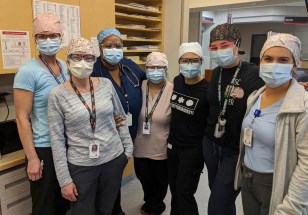Nurses deserve our thanks… along with N95 masks and a new contract
Read this article for free:
or
Already have an account? Log in here »
To continue reading, please subscribe:
Monthly Digital Subscription
$0 for the first 4 weeks*
- Enjoy unlimited reading on winnipegfreepress.com
- Read the E-Edition, our digital replica newspaper
- Access News Break, our award-winning app
- Play interactive puzzles
*No charge for 4 weeks then price increases to the regular rate of $19.00 plus GST every four weeks. Offer available to new and qualified returning subscribers only. Cancel any time.
Monthly Digital Subscription
$4.75/week*
- Enjoy unlimited reading on winnipegfreepress.com
- Read the E-Edition, our digital replica newspaper
- Access News Break, our award-winning app
- Play interactive puzzles
*Billed as $19 plus GST every four weeks. Cancel any time.
To continue reading, please subscribe:
Add Free Press access to your Brandon Sun subscription for only an additional
$1 for the first 4 weeks*
*Your next subscription payment will increase by $1.00 and you will be charged $16.99 plus GST for four weeks. After four weeks, your payment will increase to $23.99 plus GST every four weeks.
Read unlimited articles for free today:
or
Already have an account? Log in here »
Hey there, time traveller!
This article was published 03/11/2020 (1863 days ago), so information in it may no longer be current.
The nurse on the other end of the phone is nervous. You can hear it. It’s the same with every nurse who has reached out to the Free Press over the last few days offering to talk about their experiences. They’re scared of COVID-19, yes, but even more than that, they’re anxious about what could happen if they go public.
So when you ask them which hospital they work at, and which ward, they hesitate for a second. Wanting to talk about it, wanting the public to know just how frustrated they are as COVID-19 surges through the province, but also anxious about taking the risk.
“I don’t want to lose my job,” one said.
This is the bind in which many health-care workers find themselves, as the system begins to groan under the weight of COVID-19. In recent days that pressure has driven more to go public with their concerns, most notably in an open letter from doctors to the province last week. That letter has grown to include around 200 signatories.
And over the weekend, Eric Wheeler, a nurse at Victoria General Hospital, spoke out about nurses’ experiences on two wards stricken with COVID-19. Since then the Free Press has spoken to several other Manitoba nurses, all of whom applauded Wheeler’s bravery and said his experience echoed their own.
Chief among their concerns is adequate access to personal protective equipment (PPE), particularly the N95 masks which can better protect against airborne pathogens. While doctors have access to a separate supply of PPE, nurses working in areas not designated as COVID-19 wards find that N95s are “locked up” in managers’ offices.
One nurse described asking for an N95 mask to treat patients who were racked with constant, violent coughs, and were being tested for COVID-19. Managers told them that that a basic surgical mask would suffice. If the test came back positive, that would change, the nurse said, but symptoms alone weren’t enough to get one.
“You’re given a hard time just to be able to do your job,” one nurse said. “You don’t know if somebody is positive, you don’t want to bring it home. You want to care for this patient, you want to do everything you can for them. You want to give them the medications they need. But it is a fight to be able to go in a safe manner.”
When asked about these issues Monday, Manitoba’s chief nursing officer Lanette Siragusa said that PPE access is determined by guidelines developed according to each unit’s needs. While every nurse who determines they need an N95 mask based on risk assessment should get one, she said, there may be “a lack of communication.”
Workers may be questioned about why they need an N95 mask, she added, but a question isn’t a denial.
“If there’s miscommunication, certainly we want to address it,” she said.
“You’re given a hard time just to be able to do your job,” one nurse said. “You don’t know if somebody is positive, you don’t want to bring it home. You want to care for this patient, you want to do everything you can for them. You want to give them the medications they need. But it is a fight to be able to go in a safe manner.”
But this goes beyond COVID-19. In conversation, nurses also talk about pressures that have been mounting on them since long before the pandemic. About the chronic understaffing, the exhaustion and what they describe as a lack of support from management and upper levels of provincial health-care leadership above them.
“It’s been a crisis before this crisis,” one said.
It’s worth noting, again, that nurses in Manitoba have been working without a new collective agreement since their last one expired in 2017. (The terms of the old one remain in effect until a new one is bargained.) Across the world, health-care workers are hailed as the pandemic’s heroes; are we treating their labour that way, at home?
Now, it’s time to hear them. On the largest scale, the fight against COVID-19 is as big as a whole province, a whole nation, a whole world. But in another way, it is as thin as the doctors, nurses and other health-care workers who stand as the last line of defence to save those who are ill, and keep it from spreading within our most vulnerable facilities.
They have reason to be scared of the virus. They know what it can do. So they should not also have to be scared of speaking up about their concerns, or asking for what they need to stay as safe as possible while providing care. This pandemic is showing us, more than ever, how critical it is to have health-care workers’ voices front and centre.
“We just go in and do what we do,” one nurse said. “We’re not superheroes, but we’re not there to be treated like s–t, either. Who gets the raw end of the stick? The patient who can’t get out of bed. The patient who can’t talk. The patient who’s incontinent. The patient who is dying.”
melissa.martin@freepress.mb.ca
Our newsroom depends on a growing audience of readers to power our journalism. If you are not a paid reader, please consider becoming a subscriber.
Our newsroom depends on its audience of readers to power our journalism. Thank you for your support.






